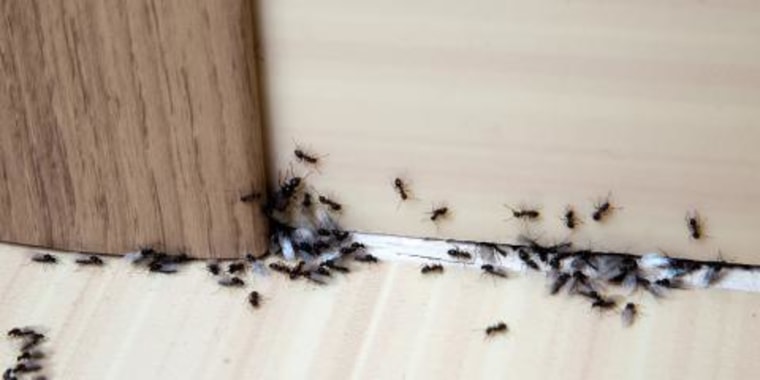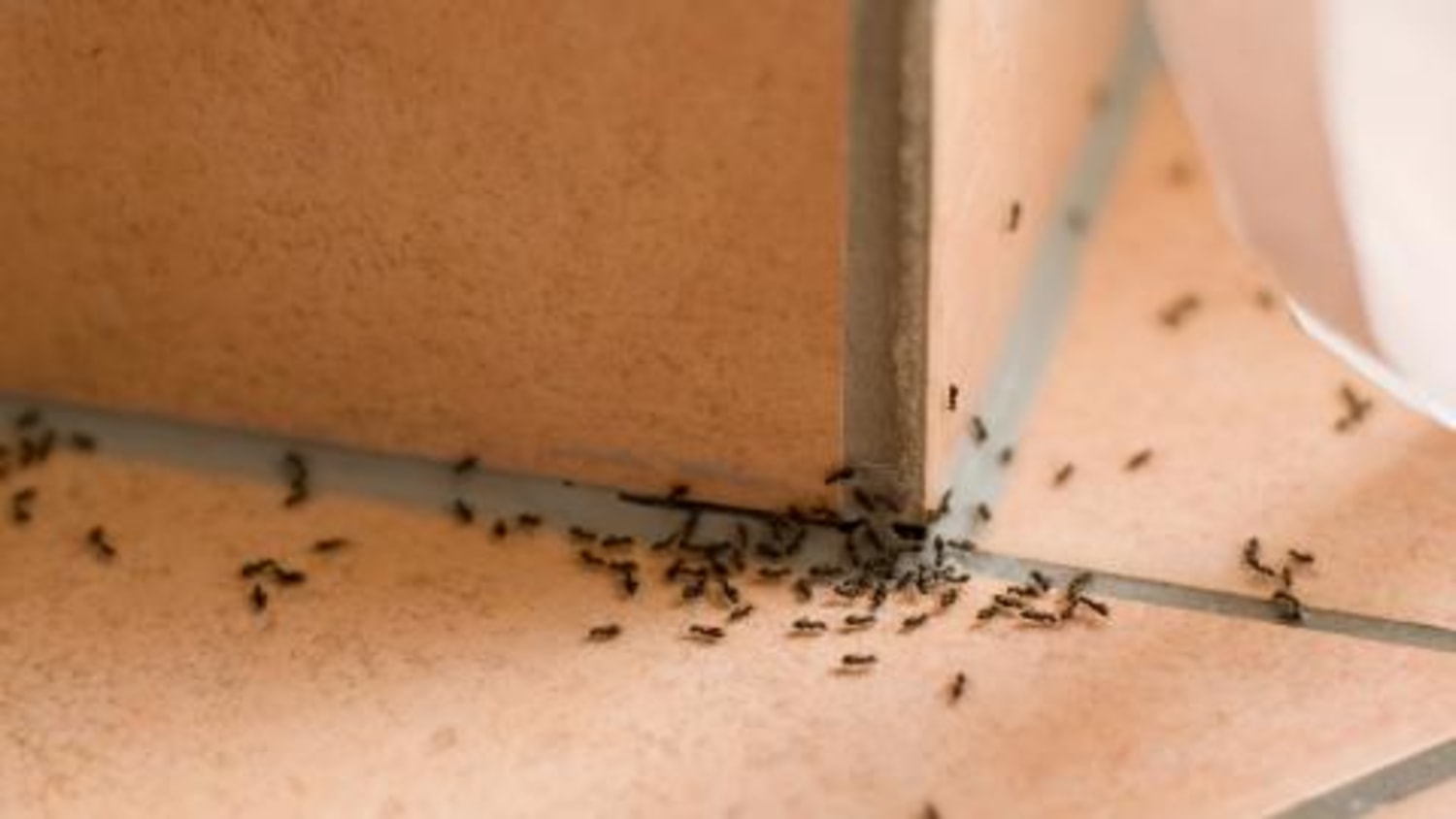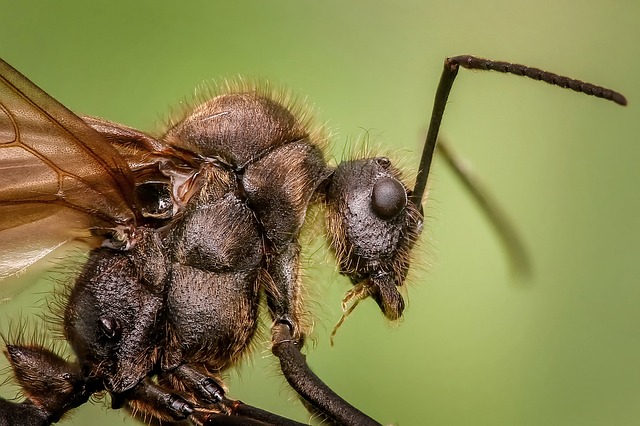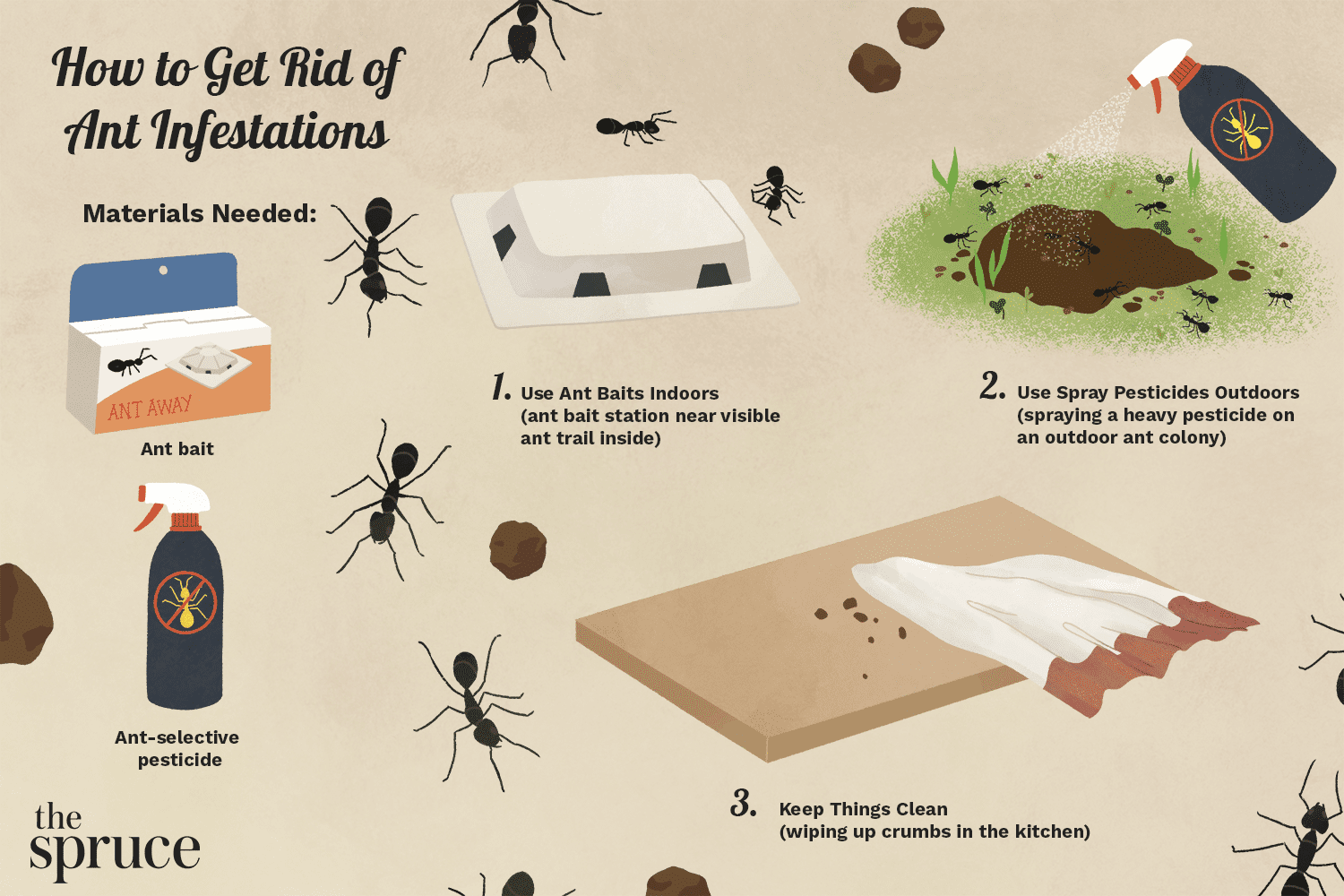Upon noticing ants in your home, promptly identify their entry points and eliminate any food sources. Next, use natural or chemical ant repellents to address the infestation.
Discovering ants in your residence often triggers immediate concern. These critters are not only a nuisance but can also compromise the cleanliness of your living space and may even harm your property, depending on the species. A swift and effective response is crucial to prevent them from establishing a colony within your home.
The key measures involve meticulous cleaning, careful food storage, and blocking their entryways. In this context, natural deterrents like vinegar or lemon juice can be valuable tools. For persistent problems, opting for professional pest control services might become necessary. Understanding the behavior of ants and preempting their needs for sustenance and shelter are central to deterring an infestation. It’s best to act as soon as you spot these unwelcome visitors to keep your home ant-free and maintain a peaceful domestic environment.
Introduction To Household Ant Invasions
Discovering a trail of ants meandering through your home can be both annoying and concerning. These unwelcome guests show up unannounced, eager to discover what your home has to offer. Understanding the nature of household ant invasions is vital in keeping your space ant-free. Let’s delve into what draws these tiny insects indoors and which types you might be hosting.
The Common Ant Varieties In Homes
Several ant species may decide to visit your living space. Each type has unique characteristics and habits. Identifying them is the first step towards eviction. The most frequent visitors include:
- Oft-seen Odorous House Ants: Known for their musty scent upon being crushed.
- Persistent Pavement Ants: Favor soil but won’t say no to your pantry.
- Wood-loving Carpenter Ants: Pose a threat to your home structure.
- Tiny Thief Ants: Infamous for their love of greasy foods and proteins.
Reasons Ants Enter Indoor Spaces
Ants invade homes in search of three main resources:
- Food: Crumbs and spills are irresistible.
- Water: They need it to survive, especially in dry climates.
- Shelter: Your house is a safe haven from the outside world.
Combatting these invasions starts with understanding the ‘why’ behind their entry. Next, we’ll explore practical steps to keep them at bay.
Initial Steps To Address Ant Sightings
Welcome to the ultimate guide for handling those unwelcome guests: ants. Spotting these tiny critters in your home can lead to frustration and dismay. But don’t fret; taking the right initial steps can help manage the situation effectively. Let’s dive into what you can do when you detect ants in your residence.
Identifying Entry Points
Squads of ants scurrying around your home is a sign to spring into action. Finding their entry points is crucial. It’s like solving a mystery; clues can be found along walls, windows, or doors. Here’s a quick guide:
- Scan along floor edges
- Check windows and door frames
- Inspect any household cracks
Immediate Actions To Deter Ants
Speed is essential when addressing an ant invasion. Your mission? To disrupt their trail and stronghold. Apply these immediate tactics:
- Clean up any food residue at once.
- Wipe down surfaces with a vinegar solution.
- Use deterrents like lemon juice or peppermint oil.
Remember, a prompt response sets the stage for a lasting solution. Keep your living space neat, your kitchen crumb-free, and storage areas well-maintained to send the ants marching elsewhere.
Natural Ant Repellents And Deterrents
Discover natural ways to keep ants away from your home. These methods are safe and eco-friendly. Learn to use common household items as your defense against these tiny invaders.
Diy Solutions With Vinegar And Lemon
Ants hate the smell of vinegar and lemon. This makes them a great choice for keeping ants at bay.
- Mix equal parts of water and vinegar.
- Use this mix to wipe down surfaces where ants roam.
Lemon works similarly:
- Squeeze lemon juice around entry points.
- Place lemon peels where you see ant trails.
The Role Of Essential Oils
Essential oils can act as a natural ant deterrent. They mask ant trails and prevent them from entering your home.
| Oil Type | How to Use |
|---|---|
| Peppermint Oil | Place a few drops on cotton balls and position them around your home. |
| Tea Tree Oil | Add to water and clean surfaces to disrupt ant paths. |
| Clove Oil | Use it directly on ant entry points to deter them. |
Remember to reapply these solutions regularly for best results.
Chemical Ant Control Strategies
Discovering ants in the house can be alarming. A chemical strategy might be the answer. These methods aim to remove ants quickly and effectively. Now, explore options to keep the pesky intruders at bay.
Selective Use Of Insecticides
Not all insecticides are equal. Some target specific ants without harming others. Read labels carefully before application. Choose products registered for indoor use. Follow directions to protect pets and family members. Consider gel formulations for targeted application. Sprays can act fast. Dusts work well in crevices. Professional exterminators can offer stronger solutions if needed.
Bait Stations And Their Placement
Bait stations lure ants with a poisonous treat. Here’s how to use them effectively:
- Find ant paths. Look where they come from and go to.
- Place baits close to these trails. Use multiple stations for best coverage.
- Keep baits away from children and pets.
- Wait. It takes time for ants to take the bait back to the colony.
- Replace baits as instructed. Fresh bait is more enticing for ants.
- Monitor and remain patient. Full elimination can take weeks.
While using these chemical strategies, maintain clean surfaces. Limit food access for ants. Seal entry points. Together, these steps can keep homes ant-free.
Sanitation To Prevent Ant Infestations
Spotting ants in your house often hints at a larger issue – neglect in sanitation. A clean home is your first defense against ant invasions. Let’s look into effective ways to maintain a spotless environment and keep the tiny invaders at bay.
Cleaning Tips
To maintain a pristine home, focus on eradicating ant trails and food sources. Regular wiping and vacuuming are essential. Use a mix of water and vinegar for a natural cleaning solution. This removes the scent trails ants leave behind. Check the following list for a spotless home:
- Wipe down surfaces immediately after use
- Clean food spills right away
- Vacuum regularly to remove crumbs and debris
- Pay special attention to kitchen appliances
- Clear out pet bowls after feeding times
Trash Management And Food Storage
Effective trash management and secure food storage are key. Ants are attracted to food remnants and odors. Consider these strategies to keep them away:
| Area | Strategy |
|---|---|
| Kitchen | Seal trash bags tightly and dispose of them promptly |
| Pantry | Store food in airtight containers |
Remember these additional tips:
- Dispose of garbage daily
- Clean trash receptacles weekly to remove residue and spills
- Never leave ripe fruit uncovered
- Ensure all packaged foods are tightly sealed

Credit: www.today.com
Physical Ant Barriers And Modifications
Physical Ant Barriers and Modifications are key in keeping ants outside, where they belong. Ants can be crafty, but a few strategic changes in your home can create a fortress against these tiny invaders. Let’s explore how sealing up gaps and reshaping your garden can make a big difference.
Sealing Cracks And Crevices
To stop ants from sneaking in, inspect your home for any small openings. Use caulk to seal these spots:
- Window frames
- Door edges
- Baseboards
- Utility pipes
Don’t forget areas like the attic or basement, where ants could have easy access. A tight seal ensures ants stay out.
Landscaping Adjustments To Keep Ants Away
Landscaping affects how ants interact with your home. Follow these steps to create a barrier:
- Trim branches that touch your home.
- Keep mulch at least six inches from your foundation.
- Choose plants that repel ants, like peppermint.
Maintaining a clear boundary between your garden and home is essential. This prevents ants from using plants as bridges to enter.
Professional Pest Control For Severe Infestations
Welcome to an essential guide on combating ant invasions in the comfort of your home. Encountering ants inside can distress any homeowner. For minor issues, DIY solutions may work. Yet, more serious infestations demand professional intervention. Understanding when and how to seek expert help is crucial for a pest-free environment.
When To Call The Experts
Identifying a severe infestation is the first step. Regular sightings of ants, especially in large numbers or in multiple areas of your home, indicate a bigger problem. Ants are not solitary creatures. Seeing them often hints at a nearby colony. Other signs include spotting ant trails, hearing rustling inside walls, or finding wood shavings, suggestive of carpenter ants. These scenarios warrant a call to the pest control experts.
What To Expect From Professional Ant Extermination
Recruiting skilled pest controllers ensures a thorough approach to an ant problem. Here is what to anticipate:
- Inspection: A complete inspection to find the source.
- Identification: Determining the ant species affects the treatment plan.
- Treatment: Utilizing the right methods and products to target the specific ant type.
- Follow-up: Checking back to ensure the problem is resolved and providing guidelines for prevention.
Selecting a professional service can ease the burden of a pest invasion, safeguarding your home. Specialists use advanced tools and treatments inaccessible to the general public. They tailor their strategies to individual situations, producing lasting results. A pest-free home requires decisive action, and for severe infestations, expert help is a reliable solution.
Monitoring And Maintenance Post-treatment
Treating your home for ants is just the start. To keep them away, you need good habits. These habits include checking your home and stopping ants from coming back. With the right steps, your ant issues can stay in the past.
Regular Inspection Routines
Set a schedule to look for ants often. Look in kitchens, bathrooms, and other damp areas. Check for nests outside too.
- Search every week.
- Use a flashlight to see better.
- Check under sinks and appliances.
Long-term Preventative Strategies
Prevent ants from returning with these steps:
- Seal cracks in walls and floors.
- Clean up food spills quickly.
- Keep food in tight containers.
- Fix leaky pipes and taps.
Remember: A tidy house is not an ant’s home!
Interesting Facts About Ants In Your Home
Discovering ants inside your home can be an unexpected surprise. These tiny invaders may be small, but they are part of a complex and fascinating world. Here’s a look into the interesting facts about ants living among us.
Beneficial Roles Of Ants
Ants play crucial roles in our ecosystem, even when they enter our homes. They are nature’s clean-up crew, breaking down organic matter and turning it into soil-enhancing nutrients. Ants also contribute to pest control by hunting other insects, thus maintaining a delicate environmental balance. Acknowledging their roles may give you a new perspective on these tiny house guests.
- Decomposers: Break down dead insects and organic waste.
- Soil Aerators: Their tunnels improve soil infiltration.
- Seed Dispersers: Help in the propagation of various plant species.
Why Ants Are Attracted To Electronic Devices
Ants are not just drawn to food crumbs or sugary spills; they are strangely attracted to electronic devices. The warmth generated by electronics creates an ideal nesting area, especially for the ‘crazy ant’, famous for infesting electronic gadgets. The electromagnetic fields can also influence the behavior of ants, compelling them to set up camp around these devices.
| Attraction Factor | Reason for Attraction |
|---|---|
| Heat | Warmth from devices offers an ideal nesting environment. |
| Electromagnetic Fields | Fields can influence and alter ant behavior. |
| Shelter | Circuited devices provide hiding spots for ant colonies. |
Understand your tiny cohabitants to develop effective strategies for managing their presence. Knowing what attracts ants and how they benefit our surroundings is the key. Your approach to dealing with ants in the house can be thoughtful and informed with these insights in hand.

Credit: www.today.com
Conclusion: Staying Vigilant
Finding ants in your home may seem minor at first. But, ignoring these critters can lead to a full-blown infestation. Now’s the time to double down on defense and show those ants they’re not welcome. We’ve shared methods to keep them out. Let’s recap the essentials and discuss the power of prompt action.
Summarizing Key Prevention Tips
Preventive measures play a huge role in keeping ants out. Check out these bullet-proof tips:
- Maintain cleanliness: Wipe surfaces and sweep floors daily.
- Seal entry points: Check for cracks and seal them up.
- Store food properly: Use airtight containers for pantry items.
- Manage trash: Take out the garbage regularly and use bins with lids.
- Eliminate moisture: Fix leaks and keep areas dry, especially the kitchen and bathroom.
The Importance Of Early Intervention
Spotting a lone ant is a sign more might be lurking. Fast action keeps small problems small. Here’s what early intervention does:
- Stops spreading: Tackling the issue early prevents more ants from joining the party.
- Saves time and money: Early action is cheaper and faster than dealing with an invasion.
- Preserves property: Ants can damage wooden structures. Acting fast saves your home from harm.
Remember, a vigilant approach to ant prevention is a surefire strategy. Use these tips and act swiftly when you spot a scout. With vigilance, you can keep your home ant-free.

Credit: www.pestdefence.co.uk
Frequently Asked Questions On What To Do When You See Ants In House
Why Are Ants Suddenly Appearing In My House?
Ants are likely in search of food or shelter. They can be attracted to sweet or sticky substances in kitchens or waste bins. Regular cleaning and proper food storage help keep them away.
What Is The Fastest Way To Get Rid Of Ants?
Use a mix of vinegar and water as a natural repellent. Clean up food residues promptly. For persistent problems, ant baits or non-toxic traps can be effective for quick elimination.
Can Ants Cause Damage To My Home’s Structure?
Some ant species, like carpenter ants, can damage wood structures. They tunnel through wood to create nests, which can weaken your home’s build over time. Early detection and treatment are crucial.
Are There Any Natural Deterrents For Ants In The House?
Yes, natural deterrents include lemon juice, cinnamon, peppermint oil, or coffee grounds. Spread these near entry points to repel ants. Regular cleaning also deters ants by removing attractive scents.
Conclusion
As you tackle ant invasions, remember the importance of staying vigilant and proactive. Ensure cleanliness, seal entry points, and opt for natural deterrents or professional help when needed. Keeping your home ant-free not only maintains its sanctity but also helps in preventing related issues.
Stay persistent, and a peaceful, ant-free home can be your reality.

I’m MD Tanvir, and I bring years of expertise gained from working closely with pest control companies to the forefront. My journey in the industry has inspired me to launch Bug Battler, a platform aimed at equipping people with the know-how to combat pests autonomously. Through Bug Battler, I aim to empower individuals with practical insights to tackle pest infestations effectively.

